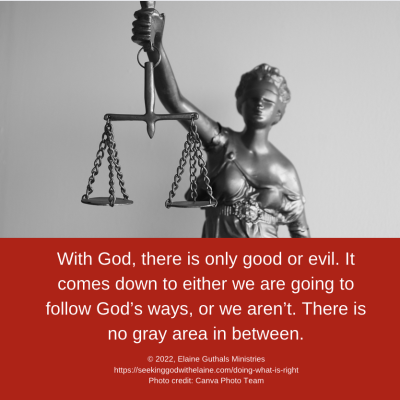Paul wrote to the Romans about the difficulty of doing what was right. This daily devotional looks at why we can’t do what is right and how God uses that.
Nuggets
- Disciples accept the fact that good is not part of our physical nature.
- Disciples know we want to do good– but can’t.
Devotions in The Goodness of Grace series

We tend to think of Paul as someone who never sinned. When he wrote the Romans, he corrected us of thinking that way.
Let’s took a look at what that means to Paul – and to us.
Let's Put It into Context
Here is a running list of nuggets for the series.
Nothing Good in Us
“And I know that nothing good lives in me, that is, in my sinful nature. I want to do what is right, but I can’t” (Rom. 7: 18 NLT)
Disciples accept the fact that good is not part of our physical nature.
Look what Paul said. “And I know that nothing good lives in me …” (Rom. 7: 18 NLT). By nature, we do not have any good in us.
Oh, yes. We can be kind by worldview standards. We can even love people.
But that isn’t enough. Sin is still there.
Only when we ask Jesus to be our Savior and Redeemer does the goodness come into our lives.
That is because the definition of good is different than what worldview people believe. Evil is the opposite of good.
Good, in the biblical sense, is the workings of God within His people through His holy, pure, and righteous behavior.
- Holy means to be set apart — because of our devotion to God — to become perfect, and morally pure while possessing all virtues.
- Perfection means we reach a state of maturity because the combination of the spiritual graces form, when all are present, spiritual wholeness or completeness — holy, sanctified, and righteous.
- Spiritual graces are worldly morals that have been submitted to God to further His kingdom instead of enhancing this world.
- Sanctified means to be set free from sin.
- Righteous means we are free from sin because we are following God’s moral laws.
- Pure means not being sinful or having the stain of sin.
- Virtues are standards of moral excellence.
- Perfection means we reach a state of maturity because the combination of the spiritual graces form, when all are present, spiritual wholeness or completeness — holy, sanctified, and righteous.
Evil is equated with sin because it is that which goes against God and His purposes.
With God, there is only good or evil. It comes down to either we are going to follow God’s ways, or we aren’t. There is no gray area in between.

The Tug of War in Us
“... I want to do what is right, but I can’t” (Rom. 7: 18 NLT)
Disciples know we want to do good– but can’t.
Disciples want to follow God’s laws and commandments. We know, when we do that, God will be glorified.
We know we can’t do it on our own. We cannot be blameless and pure without the Holy Spirit guiding and directing us.
Even then, we still sin. As much as we want to be totally good, we cannot.
Yes, every Tom, Sally, and Elaine still sin after conversion. Even Paul did — the Energizer Bunny for God. He couldn’t do what was right all the time.
Part of how we respond is based on the circumstances in which we find ourselves. What we are facing plays a big part in how we react.
No, we don’t want that to be the case. We want to react the way God wants us to every time.
Satan loves to blindside us with things. He loves to fan our doubts.
The whole purpose Satan does what he does is to get us to react without thinking and praying what does God want us to do.
The way we counter that is to seek God daily. We have to be so strong in our relationship with Him that we discern where Satan is attacking and we stand firm. Discernment means we can evaluate the situation and recognize right from wrong.
Tozer said something with which, I think, many of us struggle. He wrote, “God does not expect more from us than we are capable of being and doing.”
Resource
We have a tendency to read that as “God does not expect more from us than we are capable of doing.”
We skip the being part all together. If it does show up on our radar, we don’t hook it with the “capable of being” part.
God is in the business of growing us. We wouldn’t grow if the trials were just up to the line of what we could handle or not handle at that time.
God does not expect more from us than what He can grow us. So, He is going to give us things we don’t think we can handle.
We know two things.
1. God does not give us things to face them on our own.
2. God can handle everything.
When we don’t do what we are supposed to how we are supposed to do it, we only need ask forgiveness. Forgiveness is, when we ask, the act of God pardoning us because we have shown repentance for breaking His laws and commandments, which allows us to become holy as He is.
- Repentance is acknowledging our separation from God and expressing sorrow for breaking God’s laws and commandments by making the commitment to changing ourselves through obedience so that we no longer do the wrong things.
- Holy means to be set apart — because of our devotion to God — to become perfect, and morally pure while possessing all virtues.
- Perfection means we reach a state of maturity because the combination of the spiritual graces form, when all are present, spiritual wholeness or completeness — holy, sanctified, and righteous.
- Spiritual graces are worldly morals that have been submitted to God to further His kingdom instead of enhancing this world.
- Sanctified means to be set free from sin.
- Righteous means we are free from sin because we are following God’s moral laws.
- Pure means not being sinful or having the stain of sin.
- Virtues are standards of moral excellence.
- Perfection means we reach a state of maturity because the combination of the spiritual graces form, when all are present, spiritual wholeness or completeness — holy, sanctified, and righteous.
- Holy means to be set apart — because of our devotion to God — to become perfect, and morally pure while possessing all virtues.
Glossary

Making the Connections
Chambers talked about it almost looking like disciples had split personalities within us. One of our personalities follows God, and the other doesn’t.
It can appear that way sometimes, can’t it? When our tendencies are diametrically opposite, people are confused about which one of us is showing up in that current situation.
How Do We Apply This?
- Strengthen our relationships with God by seeking Him.
- Follow God’s laws and commandments.
- Repent when we sin.
Searching for and Seeking God
Hearing His Word (Rom. 10: 17).
Reading His Word (Rev. 1: 3).
Praying to Him (Heb. 4: 16).
Studying His Word (Ac. 17: 11).
Meditating on His Word (Ps. 1: 1-2).
Memorizing His Word (Ps. 119: 11).
Father God. We know, because of our sinful nature, there is no good in us – until we ABCD. Thank You that You designed the Plan of Salvation so that we can confess our sins to You and gain forgiveness. Help us to win the tug of war that occurs almost daily in us. Amen.
What do you think?
Leave me a comment below (about this or anything else) or head over to my Facebook group for some interactive discussion.
If you don’t understand something and would like further clarification, please contact me.
If you have not signed up for the email daily or weekly providing the link to the devotions and the newsletter, do so below.
If God has used this devotion to speak with you, consider sharing it on social media.